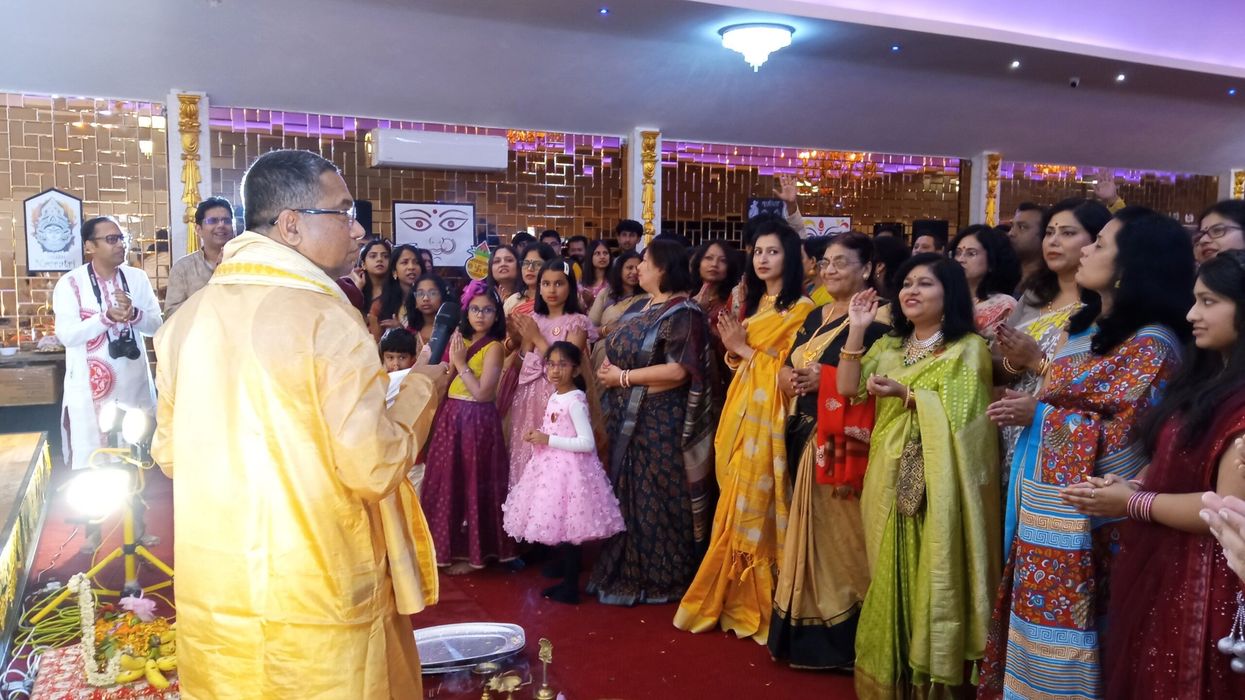I HAVE never been a “professional” Bengali, but perhaps I can wish all our readers a “Shubho Bijoya”.
The festival marks the victory of the goddess Durga over the forces of evil and the start of the Bengali new year.
Last Saturday (12) I went to the celebration of Durga Puja in Hounslow Central in London, where 53 families, mostly Bengali, have formed a charitable organisation called Prabashi. It puts together a long weekend of religious, cultural and social functions. The protima – the idol of Durga, flanked by Ganesh and Lakshmi on her right, and Saraswati and Kartik on the left – come from Kolkata.
Durga is the mother goddess, the personification of feminine power or shakti who, with many arms and weapons, slays the shapeshifting buffalo demon, Mahishasura.
Of her “children”, Ganesh, with the elephant trunk, is the remover of obstacles and the god of auspicious beginnings. Lakshmi is the goddess of wealth and prosperity – one newspaper in Kolkata has her strategically placed at the entrance to the advertising department. We always prayed to Saraswati, goddess of learning and music, before taking our exams (“please Saraswati, don’t make the quadratic equations too complicated” or “I haven’t had time to revise corn law reform so please go easy with the questions”). Kartik is the god of war.
The protimaInstead of being taken out on a river and immersed in the water, as would happen in India at the end of Puja, in Hounslow the idols are carefully stored in a warehouse for five years.
Back in Bengal, the morning prayers known as Pushpanjali – Anjali for short – are done with fresh flowers. People try to repeat the Sanskrit prayers of the priest, perhaps without understanding fully what the words mean. It’s something like: “Auspiciousness of all things auspicious! O consort of Shiva, fulfiller of all our goals! …..The power beyond all creation, preservation and destruction! O eternal one! ….Our salutations to you….Ever devoted to the salvation of the lowly and suffering who seek shelter with you! O destroyer of all misery! O Divine Mother! O Narayani! Our salutations to you.”
In keeping with tradition, Anjali flowers should be tossed only at Durga’s feet. In Hounslow, though, the flowers are recycled between one Anjali and the next.
Devout Bengalis believe that Durga leaves her marital residence and comes to visit her parental home for 10 days. No work gets done in Bengal during the Puja season – or in any season, if non-Bengalis are to be believed.
Each year, the pandals get ever more bizarre and creative. This year, for some reason, one of the idols resembled Queen Victoria. I suppose she represents feminine strength.
This is supposed to be a time of great joy in Bengali communities in India and across the world. But my family tells me Puja this year has been a little subdued because of the horrific incident in north Kolkata. Even in Hounslow there was a poster with the message: “A young lady doctor was tragically raped and murdered at RG Kar Medical College and Hospital in Kolkata. India demands justice…. Justice delayed is justice denied.”
Homemade Bengali sweetsWhat happened at the hospital goes against the grain of Bengali society. Of all the major cities in India, Kolkata is supposed to be the safest for women.
In Hounslow, the Indian population is mainly Punjabi, but there is a Bengali pocket, with many of the parents I met working in IT and reasonably confident their sons and daughters would get into Russell group universities, including Oxbridge, the London School of Economics and the like. This is true of all Indian communities, but Bengalis have a way of greeting each other, using tui instead of apni to denote familiarity. It makes people feel at home a long way from home.
As I left, I couldn’t resist spending £12 on buying a few homemade Bengali sweets. Not very wise, but they are delicious.
On the way out, I greeted Seema Malhotra, Labour MP for Feltham and Heston and parliamentary under-secretary at the Home Office and the Department of Education (equalities). With Durga on her side, she should battle prime minister Sir Keir Starmer for a more senior job.




